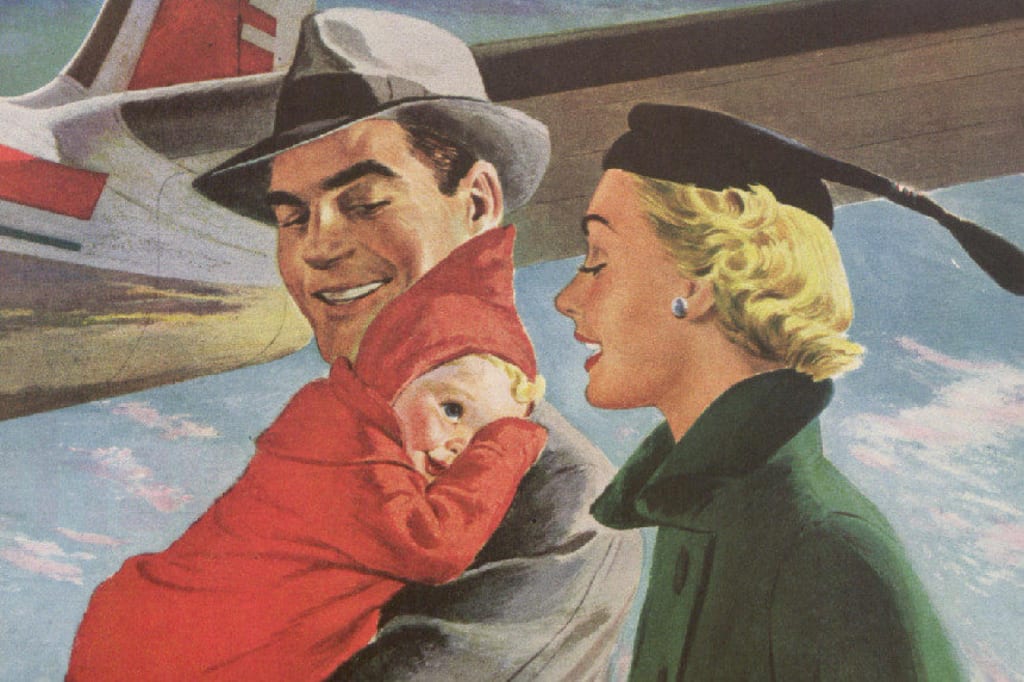
The first thing I remember noticing about my grandfather was that he seemed to be perpetually of place. The adults in my life wore regular clothes, jeans, t-shirts, and occasionally suits for funerals and business, but aside from the occasional tie-dyed hippie in the Arts district or Skid Row, the clothing patterns in my life were the same. Grandpa Joseph, on the other hand, always seemed to have just walked out of a time machine from 1949, impeccably dressed in a pinstripe or wool jacket, depending on the weather, a wide-brimmed fedora perfectly centered on his head, a tie, complete with tie pin and clip. And pants, always creased at the ankle, flowing naturally into patent leather Oxfords. I cannot think of a time when I did not hear the melodies of the Ink Spots or Frank Sinatra tumbling out into the street when we came for dinner, and I remember always scrambling out of the car and bolting into the house to see the walls, covered with photos of a time past, and smelling my grandfather’s aftershave in his study, hearing the rumble of his voice calling to me. "Come here Alex, Grandma has something for you to try."
As I grew older, and my grandfather turned 80, then 90, I began to notice more things. I noticed the smell of cigar smoke, as if it was layered under the wallpaper in his study, and I noticed Grandma Alice always had a handkerchief on hand in case my grandfather started coughing. My mother told me that my grandfather had moved to Los Angeles from Chicago in September of 1956 when my grandmother became pregnant, and that, for all intents and purposes, he had taken nothing from Chicago but his possessions, having no friends, no family, no continued correspondence to take note of. Nothing to anchor him in what might as well have been a separate life. My grandmother spoke of their past with fondness, regarding times of splendor and fortune after the war, regaling me with tales of my grandfather spinning her around, dress twirling, in so many ballrooms and bars, how she felt she had never stopped spinning.
As I became a teenager, I found my grandfather watching his words more, speaking tentatively of his past life around me, as if he knew now that I would be able to figure out whatever he was trying to hide. I did not worry about any of this though; I made a conscious, measured decision to enjoy the time I had with my grandparents, these people who lived in a pocket of the world all to themselves, who gave me the privilege to live in a different, seemingly better time, for a couple of hours a day every week. They only had one daughter, who only had one son, but they loved me with love enough for 10 grandchildren.
I turned 21 in the summer of 2003, and my grandfather passed away of lung cancer in October. The mortuary and church that all of his Los Angeles friends had used for their families treated him like one of their own, and he was laid to rest in his favorite suit and tie; as my grandmother remarked, ‘still as handsome as the day we were married.’ Our family rallied, as families do, around our loss, helping my grandmother to sell their home and putting her husband’s memories and possessions away into storage. It turned out that my grandfather, for the 20 years that I was able to know him, had maintained a storage unit that was a perfect image of a man who experienced his 30s in 1950s Chicago. A mahogany radio, about 3-4 feet tall, that could have been broadcasted one of FDR’s fireside chats, sat in the back, flush with the wall. Boxes were neatly stacked and labeled, with tags like ‘photos’, ‘files’, ‘finance’, etc. There was a rack of clothes, suits complete with pants, ranging from tan and white to navy and black, but I had never seen any of them on my grandfather. There were crates with old photo albums, hats and glasses, old jewelry, and an empty box of 36 caliber shells.
Perhaps the most interesting item, however, opposite the wall with the radio, was a bookcase made of black metal, which seemed very out of place in comparison to the 1940s decor that the rest of his possessions wore so proudly. Packed on all 6 shelves were memories ranging over 60 years, weddings, birthdays, parties, vacations, in all different formats. I spotted reels of film, tapes for a VCR that I couldn’t find, and, of course, books. In my early life, my grandfather swept me away with tales from Bradbury and Asimov, which were plentiful on the shelves. Tucked in the top shelf in the back, as out of place as the shelf itself, was a small black book, clothed in old, beaten leather that had been weathered by familiar hands. It appeared lost if an object could be; it was as if it was supposed to be with Grandpa Joseph, yet I had never seen him with it. It wasn’t meant for a storage container. It was eclectic, belonging to no one, and I was nothing if not attuned to things that did not belong. And so I opened it, and it was, indeed, out of place in this tidy, packed away unit. Crammed on every page, in black ink that didn’t quite bleed through to the next page but tried its hardest, were figures, names, dates, and numbers.
As I sat down and looked more critically, a structure in the chaos appeared. While the numbers and names were stacked and shoved into every corner of the thin sheaves of paper that were sewn meticulously into the leather spine, they were a list. It went: name, date, number, and a percentage. Some of the names had nicknames in parentheses, and the numbers fluctuated, small amounts like three to five hundred, all the way up to fifteen to fifty thousand. The most fascinating part of the notebook to me, however, was a familiar symbol in front of each number. A dollar sign. I held onto the book for a week, and I was bursting with questions. What was this hidden past I had stumbled upon? Why did my grandfather hide it? Why did he keep it? I went through the book again and again, and I made new observations each time. For one, there were small slashes by nearly every entry in the list, as if indicating an act of completion. Secondly, some of the names repeated, like Alfred Moon, who seemed to be in the notebook for the same amount at least twenty times. And so I resolved to ask my grandmother and hoped that this was not a secret to her.
I visited her on the normal day, Tuesday before her exercise, on a bright day, and the sidewalk hummed with a smooth heat as I walked up their home’s worn steps. She made me a cup of coffee in the cup I had drunk from a thousand times, and I pulled the book out. It seemed to suck the heat from the room, and I saw for the first time a shadow pass behind her eyes. ‘I was wondering when you would ask about that.’ She sounded defeated. "Oh Alex, I hope you never live the life Joseph did in the beginning. The running, the doubt. We fought so hard for this part of our life to be secluded, and we raised a family on a new foundation. My Joseph did what he had to do, and I assure you that for the 60 years since we left, he hadn’t thought about it once." I still had no idea what she was talking about. I leaned forward, trying not to appear eager. "Who was he?" I asked. She sat back in her chair. "He was a collector. His bosses ran the stables, the casinos, the races, everywhere you could bet. But the people who bet often lost. And it was Joseph’s job to find them and procure the money. He was the best. But I became pregnant, and they wouldn’t let him go. So we bought our way out, and we never looked back." It seemed to spill out of her. I had to know more. "This final score, 20,000 dollars. It’s the only score that isn’t slashed. He left without resolving the last score?" I spoke slowly, as I could tell she was agitated. She shook her head, and a slight smile crossed her face. "No, my love. A collector like Joseph could never leave a job undone. My husband was collected in all aspects of his life, and this was no exception. This was always the plan. You were his heart and soul, and he wanted to make sure you would always be happy and remember him in your happiness. That score was The Whale, the one who Joseph played against, who could not stumble into a good bet if he tried. Joseph worked for 5 years to build against The Whale. He worked at the biggest depository in Chicago, and the week before we left, Joseph collected. 20,000 dollars in unmarked, untraceable bills that Joseph’s bosses would never see, but certainly would have killed him over. The money was of no consequence, but they loved him and trusted him. It was only ever a contingency, but we got our footing and became more fortunate than we could have ever imagined, and we never had to use it." My mind was reeling. She continued. "This is his gift to you, Alex. His only wish was that you would love his legacy just as he was proud of it. If you didn’t find it and ask, you would have never known, but he knew you had his curiosity, his tenacity, his organization." She got up from the chair, straightened her back, and walked slowly, not painfully but familiarly, to the wall that added a photo to itself every week. I had always looked at the photos of Old Chicago, pictures of my great grandparents at Ellis Island, and hadn’t paid much attention to how they were laid out. But I was in the center, the focal point of the wall, in my mother's arms, in a photo I don’t remember being in. She took the photo down, and on the inside of the frame was a key. She went to his study, and unlocked a drawer at the back, pulling from it a box that smelled like my grandfather. I held it, and I could feel where his hands had touched it. I felt tears come to my eyes, and my grandmother held my hands. She leaned over the box and spoke. "He knew what he was doing. It is your money to do what you wish. This too shall pass." She went into the next room and came back with a fedora I knew I had seen hundreds of times on my grandfather’s head, and placed it on top of the box. "Don’t spend it all on hats."
About the Creator
Elliot Cohen
Writer of Anything





Comments
There are no comments for this story
Be the first to respond and start the conversation.